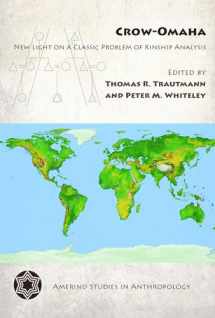
Crow-Omaha: New Light on a Classic Problem of Kinship Analysis (Amerind Studies in Archaeology)
ISBN-13:
9780816507900
ISBN-10:
0816507902
Edition:
First Edition
Author:
Thomas R. Trautmann, Peter M. Whiteley
Publication date:
2012
Publisher:
University of Arizona Press
Format:
Hardcover
360 pages
FREE US shipping
Book details
ISBN-13:
9780816507900
ISBN-10:
0816507902
Edition:
First Edition
Author:
Thomas R. Trautmann, Peter M. Whiteley
Publication date:
2012
Publisher:
University of Arizona Press
Format:
Hardcover
360 pages
Summary
Crow-Omaha: New Light on a Classic Problem of Kinship Analysis (Amerind Studies in Archaeology) (ISBN-13: 9780816507900 and ISBN-10: 0816507902), written by authors
Thomas R. Trautmann, Peter M. Whiteley, was published by University of Arizona Press in 2012.
With an overall rating of 4.3 stars, it's a notable title among other
books. You can easily purchase or rent Crow-Omaha: New Light on a Classic Problem of Kinship Analysis (Amerind Studies in Archaeology) (Hardcover) from BooksRun,
along with many other new and used
books
and textbooks.
And, if you're looking to sell your copy, our current buyback offer is $0.57.
Description
The “Crow-Omaha problem” has perplexed anthropologists since it was first described by Lewis Henry Morgan in 1871. During his worldwide survey of kinship systems, Morgan learned with astonishment that some Native American societies call some relatives of different generations by the same terms. Why? Intergenerational “skewing” in what came to be named “Crow” and “Omaha” systems has provoked a wealth of anthropological arguments, from Rivers to Radcliffe-Brown, from Lowie to Lévi-Strauss, and many more. Crow-Omaha systems, it turns out, are both uncommon and yet found distributed around the world. For anthropologists, cracking the Crow-Omaha problem is critical to understanding how social systems transform from one type into another, both historically in particular settings and evolutionarily in the broader sweep of human relations. This volume examines the Crow-Omaha problem from a variety of perspectives—historical, linguistic, formalist, structuralist, culturalist, evolutionary, and phylogenetic. It focuses on the regions where Crow-Omaha systems occur: Native North America, Amazonia, West Africa, Northeast and East Africa, aboriginal Australia, northeast India, and the Tibeto-Burman area. The international roster of authors includes leading experts in their fields.The book offers a state-of-the-art assessment of Crow-Omaha kinship and carries forward the work of the landmark volume Transformations of Kinship, published in 1998. Intended for students and scholars alike, it is composed of brief, accessible chapters that respect the complexity of the ideas while presenting them clearly. The work serves as both a new benchmark in the explanation of kinship systems and an introduction to kinship studies for a new generation of students.Series Note: Formerly titled Amerind Studies in Archaeology, this series has recently been expanded and retitled Amerind Studies in Anthropology to incorporate a high quality and number of anthropology titles coming in to the series in addition to those in archaeology.


We would LOVE it if you could help us and other readers by reviewing the book
Book review

Congratulations! We have received your book review.
{user}
{createdAt}
by {truncated_author}


